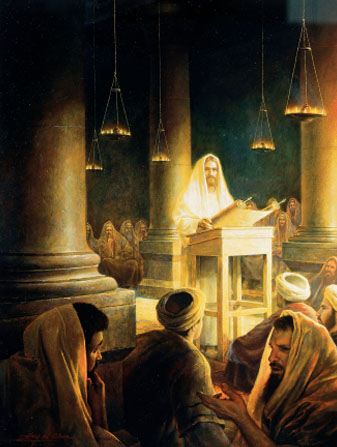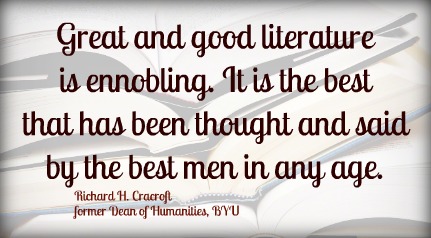The true measure of literary greatness depends on, well, how you measure it. Is great literature defined by critics, readers or awards? Longevity through generations? Literature that inspires change—political, cultural or religious? What yardstick is used, so to speak, in making a judgment? A recent New York Times column stated that in 1888, Orson Whitney—a leader in The Church of Jesus Christ of Latter-day Saints, sometimes inadvertently called the Mormon Church—spoke of the possibility of Mormon literature, saying, “We will yet have Miltons and Shakespeares of our own.” The column stated that, 125 years later, this has not happened. [1] The columnist is both right and wrong. By the world’s standards, Latter-day Saints might not have their own literary giants. But Bishop Whitney never intended Latter-day Saints to be literary giants according to the world’s standards—he intended them to be literary giants according to the Lord’s standards. He said:
It is by means of literature that much of this great work will have to be accomplished: a literature of power and purity, worthy of such a work. And a pure and powerful literature can only proceed from a pure and powerful people…. Experience has taught me that it is the heart, not simply the head, we must appeal to, if we wish to stir the soul. The intellect may shine, but it is the bosom that burns, and warms into life every movement that is born to bless humanity. …
We will yet have Miltons and Shakespeares of our own. God’s ammunition is not exhausted. His brightest spirits are held in reserve for the latter times. In God’s name and by his help we will build up a literature whose top shall touch heaven, though its foundations may now be low in earth. [2]
And by the Lord’s measurement, Latter-day Saints may indeed have their own Miltons and Shakespeares, Austens and Brontës.
What Would the Savior Think is Great Literature?
 Literature that is pure and powerful can help further the work of the Lord—which is to bring souls unto Him and to help us feel of His love. An appropriate question, then, would be: What would Jesus think is great literature? Of this query, Elder Boyd K. Packer, a member of the Quorum of the Twelve Apostles (with the First Presidency, the governing body of The Church of Jesus Christ), said:
Literature that is pure and powerful can help further the work of the Lord—which is to bring souls unto Him and to help us feel of His love. An appropriate question, then, would be: What would Jesus think is great literature? Of this query, Elder Boyd K. Packer, a member of the Quorum of the Twelve Apostles (with the First Presidency, the governing body of The Church of Jesus Christ), said:
That is well worth keeping in our minds if we have the talent to compose music or poetry, to illustrate or paint, or sculpt or act, or sing or play or conduct.
What do I think He would think? I think He would rejoice at the playing of militant martial music as men marched to defend a righteous cause. I think that He would think there are times when illustrations should be vigorous, with bold and exciting colors. I think He would chuckle with approval when at times of recreation the music is comical or melodramatic or exciting. …
I would think that He would think there is a place for art work of every kind—from the scribbled cartoon to the masterpiece in the hand-carved, gold-leaf frame. [3]
But of Bishop Whitney’s statement that “Mormons will yet have their Miltons and Shakespeares,” Elder Packer said in his 1976 address:
The greatest poems are not yet written, nor the paintings finished. The greatest hymns and anthems of the Restoration are yet to be composed. The sublimest renditions of them are yet to be conducted. … When they are produced, who will produce them? … They will be produced by those who are the most inspired among us. Inspiration can come to those whose talents are barely adequate, and their contribution will be felt for generations; and the Church and kingdom of God will move forward just a little more easily because they have been here. [3]
There is a time and a place for all things—and for all kinds and works of art that do not offend the Spirit. To produce works of literary and artistic greatness to further the work of the Lord requires inspiration from His Spirit. Elder Packer said:
Go to, then, you who are gifted; cultivate your gift. Develop it in any of the arts and in every worthy example of them. If you have the ability and the desire, seek a career or employ your talent as an avocation or cultivate it as a hobby. But in all ways bless others with it. Set a standard of excellence. Employ it in the secular sense to every worthy advantage, but never use it profanely. Never express your gift unworthily. Increase our spiritual heritage in music, in art, in literature, in dance, in drama.
When we have done it our activities will be a standard to the world. And our worship and devotion will remain as unique from the world as the Church is different from the world. Let the use of your gift be an expression of your devotion to Him who has given it to you. [3]
Literature that is pure and powerful indeed has come from Latter-day Saints. Many Latter-day Saint writers and authors have been less concerned with achieving literary greatness and more concerned with spreading light of the gospel to the world through their literature. Many are also working to tell a good story in a way that won’t offend the Spirit of God—in various genres. And those are a standard to the world.
Literature That Touches Heaven
 Truly great works of art and literature are born of inspiration—and inspire others. Literature can be a tool, according to Bishop Whitney, that God uses to further His work. Bishop Whitney said:
Truly great works of art and literature are born of inspiration—and inspire others. Literature can be a tool, according to Bishop Whitney, that God uses to further His work. Bishop Whitney said:
All must be preached to; all must be sought after…. And whither we cannot go, we must send; where we cannot speak we must write. … For over fifty years the gospel has been preached to the poor and lowly. It will yet go to the high and mighty, even to kings and nobles, and penetrate and climb to places hitherto deemed inaccessible. Our literature will help to take it there. … [2]
From poetry to good books to short stories, great literature teaches us truth even as it entertains and transports us to another world. The late William James Mortimer, former publisher of the Deseret News in Salt Lake City and the former general manager of Deseret Book Company, said:
In all our reading, and in the search for entertainment of any form, we should remember the admonition given by the Lord less than three years after the organization of the Church to “seek ye out of the best books words of wisdom” (Doctrine & Covenants 88:118). The significant part of this injunction seems to be that what we read, or for that matter, listen to or view, should give us wisdom and make our lives better for the time spent with it.
The time we spend in reading should enlighten and edify us and bring into our lives wisdom and great treasures of knowledge. [4]
Gerald Lund and Jerry Borrowman, Richard Paul Evans and Anita Stansfield are among the Latter-day Saint authors who lift us with their inspirational stories. The late Richard H. Cracroft, then dean of the College of Humanities at Brigham Young University, the flagship school of The Church of Jesus Christ, wrote:
… Through a happy combination of a good story (plot), a good philosophical idea or truth (theme), and good writing (art), a careful wordsmith or craftsman (author) can shape words, sentences, and paragraphs into a living experience just as True (with a capital T) as if it has truly (with a small t) happened to us. For through reading fine fiction we vicariously experience adventure, insight, and lives otherwise unavailable to us; and when we ponder those new lives and learn from them, our own lives are somehow charged with a new capacity for joy, for understanding, for beauty, for truth, for wonder. Through well-wrought fiction we not only strengthen our individuality, but we also cement our solidarity with others’ lives and with both the invisible and visible world, past and present. [5]
An excellent example of this is Gerald Lund’s historical fiction series The Work and the Glory, which tells the story of the beginnings of The Church of Jesus Christ through the eyes of a fictitious family. Readers gain an appreciation of the struggles of the early Latter-day Saints through this series.
Poetry is a Song of the Heart
Great poetry is the song of the heart—and so Latter-day Saints add music. Many beautiful, stirring Latter-day Saint poems are sung as sacred hymns in Church meetings. The poetry of Eliza R. Snow, an early member of The Church of Jesus Christ, is found in many Latter-day Saint hymns today. William Clayton, another Latter-day Saint pioneer, also wrote one of my favorite songs of praise, “Come, Come, Ye Saints.” Thus, the Latter-day Saint hymnal could really be seen as a book of poetry—put to sacred music. These hymns speak to the soul—a measure of great literature. Elder Dallin H. Oaks, an Apostle of Jesus Christ, said:
Sacred music has a unique capacity to communicate our feelings of love for the Lord. This kind of communication is a wonderful aid to our worship. Many have difficulty expressing worshipful feelings in words, but all can join in communicating such feelings through the inspired words of our hymns. [6]
Bishop Orson F. Whitney, the early Latter-day Saint leader, was a gifted poet in his own right. This is the reason he was able to speak so eloquently on the subject. Beautiful prose and music can lift us from our sadness, transport us to other worlds and help us feel the Spirit of God in our lives. A year and a half ago I experienced a great loss. I found great comfort in the words of the hymn “Come, Come Ye Saints,” which was written by an early Latter-day Saint named William Clayton. One verse that really touched my heart was this:
Why should we mourn or think our lot is hard?
‘Tis not so; all is right.
Why should we think to earn a great reward
If we now shun the fight?
Gird up your loins; fresh courage take.
Our God will never us forsake;
And soon we’ll have this tale to tell—
All is well! All is well!
That is the power of beautiful verse—it helps to bring the Spirit of the Lord into our lives and lift us to greater heights. What began as a tribute to William Clayton’s wife and child has become an anthem of faith and hope for members of The Church of Jesus Christ everywhere. This is truly great literature, set to music.
A Great Story Can Be Entertaining, Too
Literary giants don’t have to just be cerebral—they can be fun, too. Pride and Prejudice, for example, is a literary classic as well as an entertaining read. Elizabeth Bennett, the protagonist, learns through sad experience the folly of misjudging others based on her own biased opinions. Brandon Mull and Orson Scott Card are among the Latter-day Saint authors who seek to entertain while telling a great story—that doesn’t contain material offensive to the Spirit of God. To the critics of the world, this often relegates Latter-day Saint fiction writers to the genre of young adults. But that usually means the characters stay out of the bedroom and aren’t as violent as other “adult” books.
Author Shannon Hale, a Latter-day Saint who also writes young adult fiction—and received a Newberry Honor award for her book Princess Academy— said, “I think Mormons tend to have hope and believe in goodness and triumph, and those portrayals can ring false in a literary world.” [1] They don’t, however, ring false to Latter-day Saints. Shannon Hale said that when she was going to school for her master’s, most of the books she was assigned were written as if the “decline and ultimate destruction of the human spirit” were vital ingredients to an honest depiction of life. Elder Quentin L. Cook, an Apostle of Jesus Christ, said:
The new morality preached from the media’s pulpit is nothing more than the old immorality. It attacks religion. It undermines the family. It turns virtue into vice and vice into virtue. It assaults the senses and batters the soul with messages and images that are neither virtuous, nor lovely, nor of good report, nor praiseworthy.
The time has come when members of the Church need to speak out and join with the many other concerned people in opposition to the offensive, destructive, and mean-spirited media influence that is sweeping over the earth. [7]
The media to which Elder Cook is referring includes literature as well as movies, TV, etc. Great literature can be entertaining without celebrating or flaunting immorality, debauchery or any other behavior that is contrary to the laws of God. There are exciting and powerful stories to be told—without all the stuff that causes the Spirit of God to withdraw from our lives. And when we have great stories with great morals that are fun to read—that is truly inspired, truly great literature. That’s not to say that writers only focus on the good and not the bad—people make mistakes. People are human, and they err. But the greatest stories show the triumph of the human spirit in the depths of adversity—despite our human weakness and folly. Those are the stories that inspire and uplift.
Great Literature is a Source of Knowledge and Truth
 Great literature—fiction and nonfiction alike—is a source of knowledge and truth. Powerful fiction can help us see the heroic qualities we all have. Inspiring nonfiction can uplift us and teach us about God. The prophets and apostles of The Church of Jesus Christ have written excellent and inspiring books. We have authors writing fiction stories of many genres that uplift our spirits. Latter-day Saints truly have great literature—by the Lord’s standards. Latter-day Saint writers and authors, it seems, have taken Elder Packer’s counsel to heart and written not for the acclaim of the world but to tell a good story, with a good moral—one that will not offend the Spirit of God.
Great literature—fiction and nonfiction alike—is a source of knowledge and truth. Powerful fiction can help us see the heroic qualities we all have. Inspiring nonfiction can uplift us and teach us about God. The prophets and apostles of The Church of Jesus Christ have written excellent and inspiring books. We have authors writing fiction stories of many genres that uplift our spirits. Latter-day Saints truly have great literature—by the Lord’s standards. Latter-day Saint writers and authors, it seems, have taken Elder Packer’s counsel to heart and written not for the acclaim of the world but to tell a good story, with a good moral—one that will not offend the Spirit of God.
Elder Oaks said:
Our religious faith teaches us that we should seek learning by the Spirit and that we have a stewardship to use our knowledge for the benefit of mankind…. Our quest for truth should be as broad as our life’s activities and as deep as our circumstances permit. [8]
When we look at great literature as a source of knowledge and truth—as well as a great story and great literature—we have a different yardstick to measure its value. It is through this lens that we’ll see the great writers, poets and playwrights among the Latter-day Saints. As the late Richard Cracroft, the former dean of BYU’s College of Humanities, said:
The Latter-day Saint, charged to see all things as spiritual, will therefore insist upon a literature which celebrates that drama, a literature which celebrates men and women who learn—through trial and error—the good and great and eternal values. …
No doubt, we will yet have Miltons and Shakespeares of our own. But such literary greatness will be achieved only by great souls. Our religion is capable of cultivating those great souls; and it shall. [9]
I am a wife and mother of 4 beautiful children in a small town in the mountains of Idaho. We ski as a family in the winter and camp, fish, and go to the beach in the summer. I’m a lifelong member of The Church of Jesus Christ of Latter-day Saints, and I am grateful for the Savior and the blessings of the gospel in my life.



